Whether you grew up climbing mountains, camping in the backcountry or if “glamping” is more your style, more and more parents are raising the next generation to not only be aware of but also embrace the outdoors and the wonders of the wilderness. The health benefits of getting outside, even just to walk the dog or play in the local park, are documented and substantial, but many parents seek to do more. Among other things, they want their kids to understand and appreciate the backcountry, the fleeting natural beauty of wildflowers growing by a stream, the sight of a mountain goat or marmot wandering along a rocky landscape, the dangers of fire and lightning and the challenge of conquering a tough trail. Life lessons and the skills to work through them can be readily found in the outdoors, and many parents are seeking them out to share them with their kids.
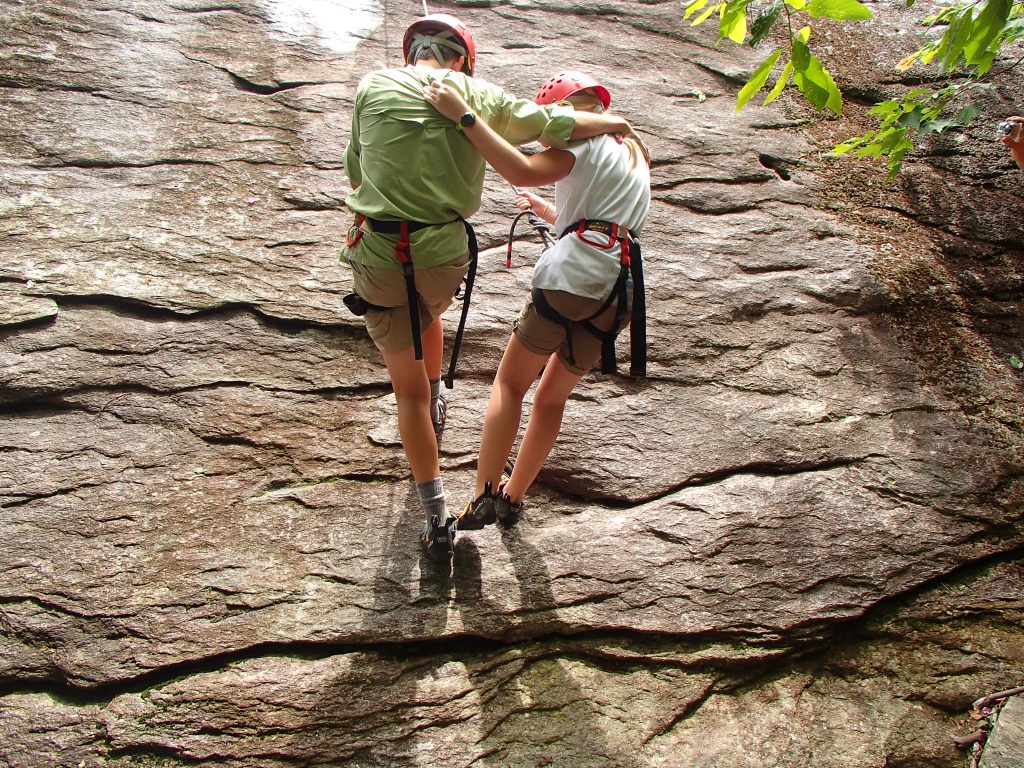
Outward Bound Expeditions for Families are a unique opportunity for a parent and their child to deepen their appreciation for one another and strengthen their bonds while learning new skills in the wilderness.
Skills for a Lifetime
Heading into the outdoors with your kids can instill several life skills that stick with them. Food preparation and cooking are fundamentals, along with starting and safely tending to a fire, cleaning up after yourself and leaving as little trace as possible from your visit in the wilderness. With all that we read and hear about regarding the state of the environment and growing awareness of sustainability practices and needs, leaving a lighter impact in the natural world (and in general) is of great importance to both parents and kids these days. Many outdoor programs and codes exist around leaving no trace in the wilderness, but the PBS Parents Expert Q&A on “Raising Environmentally Conscious Kids” stated it well when they said:
“Recent research has shown that more than any other factor, one thing does more to foster environmental consciousness than anything else; this is simply the act of getting children outdoors. As prominent environmental educator David Sobel eloquently stated, ‘one transcendent experience in nature is worth a thousand nature facts.’ It turns out that children who have an immersive experience in nature between the ages of 5 and 10 foster a deep love of the environment that they carry with them their entire lives. Aside from significantly increasing the likelihood that they will actively work to preserve the important life-giving aspects of the environment as adults, an engagement with nature has other positive cognitive impacts, from an improved performance in school to a greater involvement and concern for community well-being. A recent study of 300 of the world’s most innovative thinkers and leaders showed clear links between childhood immersion in nature and an out-of-the-box creativity and tireless commitment to society.”
Things like knot tying and navigation are also useful tools, though it’s often the learning process that can be the most important. Acquiring a new mindset around trying new things, conquering fears and many other elements of the learning process are sometimes easier to do in a different physical setting than you’re used to. Many parents and kids who choose to backpack, rock climb, canoe or embark on other adventures with Outward Bound courses find this out firsthand.
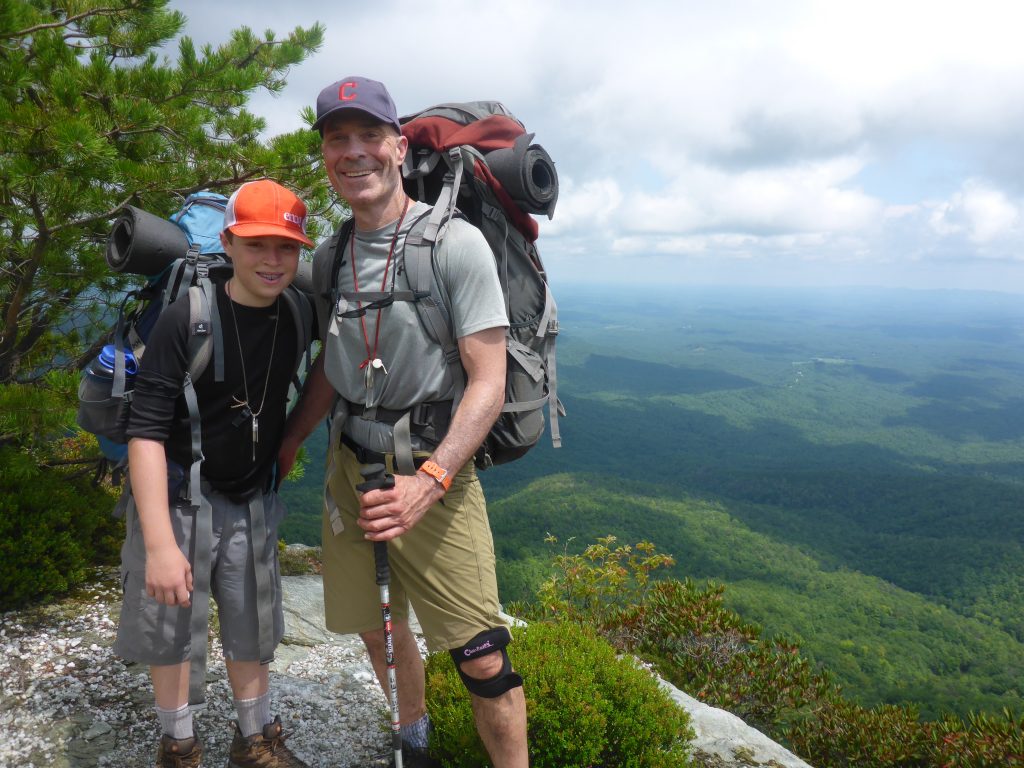
As families learn together, work together and laugh together, they develop self-reliance; learn to take pride in their craftsmanship; and deepen their appreciation for one another and the world around them.
One of Outward Bound’s Lead Instructors offered several insights about parents and their kids going on an expedition together:
“There are a number of different challenges to working a parent/child course, but I think one of the most important is that parents have a tendency to hinder the learning style that we most prize at Outward Bound, which is that of learning through failure. It can be a powerful moment for parents to recognize that they must stand back and let their child struggle rather than step in and help them. Encouraging parents to let their children be individuals on course or giving parents their own challenges to accomplish – that are appropriate in skill and strength – can be an effective way to empower parents to work on their own tasks without interfering with the experience of their child.” – Benny Dalley, Lead Instructor, North Carolina Outward Bound School
Getting out into the wilderness can be the perfect catalyst for new experiences and creating an appetite for curiosity that is sometimes more difficult at home, at school or at work. Setting goals, creating action plans, solving problems and learning through failure are all real-life skills that both kids and their parents use daily. They are equally applicable when you’re talking about plotting a trail, figuring out the best place to camp for the night, what NOT to do when your feet get blisters or how to hang a bear bag high enough that it’s secure and safe. The outdoors can be the perfect foundation for developing these skills, and so many others.
Surprising Support
Until he went on a week-long backcountry trip with his mom, Zachary had no idea that his mom could light a campfire or that she had a crippling fear of heights. “She told me that she liked to hike when she was a kid, but we never did it as a family until I was a teenager,” he said. “I don’t think she wanted to rock climb, but she didn’t want to fail either, so it was cool that I got to help her get to the top.”
Parents often don’t like to admit fears or weaknesses in front of their kids. There’s a vulnerability involved and a loss of control that can be uncomfortable for some. As much as kids learn from their parents every day, when the environment changes and both parents and kids are doing new things, the balance can shift to being more equal.
“Something else that parents struggle with is showing vulnerability to their kids,” added Lead Instructor Benny Dalley. “Whether it is going off the 40 foot big swing at our ropes course or struggling up steep terrain with a heavy pack, it is important to adults to understand that their children will eventually come to see them as people, and not as the superheroes they may have formally believed. As an Instructor, coming to adults with this understanding and compassion can certainly ease this challenging transition.”
Kids find great value in going into the wilderness with a parent. “The best thing about heading out into the Boundary Waters with your parents is that it wasn’t as unexplored or unfamiliar as it would have been otherwise,” said Jayden, who went on a canoeing expedition with a crew that included both his mom and dad through the Boundary Waters of Northern Minnesota during the summer of 2015. “I felt more secure with my parents there. I didn’t get homesick or anything like some of the others, because I go camping with my parents all the time. When your parents are away from work, they’re more relaxed and we always have a good time.”
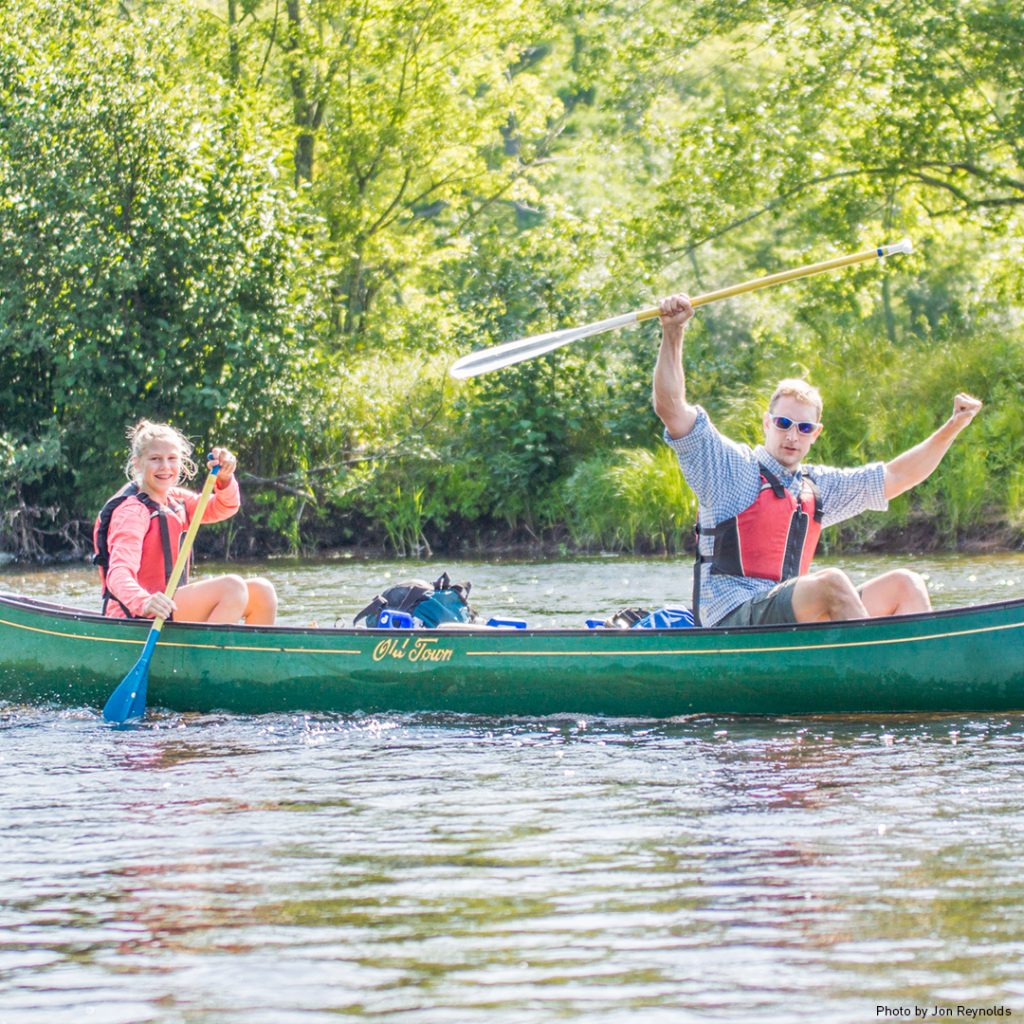
When family members experience new challenges and learning environments together, their bond strengthens and they learn new things about each other.
Relationships grow and change over a very short period of time when parents and their kids go into the wilderness together, especially on courses like those offered by Outward Bound. There are “duos” instead of “solos” for time spent on reflection and contemplation. Young students telling their parents “I’m proud of you” are moments that are particularly memorable, and the trust that is built lasts a lifetime.
“Many of the students we work with don’t feel like their parents truly ‘trust’ them or have ever put them in a position of responsibility,” Dalley adds. “Doing trust exercises, including having students belay their parents while rock climbing, can be a valuable teaching tool that helps both parties learn to trust each other.”
It’s not all smooth sailing, though. Teenage student Jayden admits that “I couldn’t settle fights with my friends the way I wanted to” with his parents along. “If I got rowdy or something, I had to apologize immediately because my parents were there. I couldn’t act as much like myself with my friends since my parents were around.” This is probably one thing that’s no different at age 40 than it is at 14. It’s harder to misbehave or be completely unfiltered with your mom watching you from 30 feet away.
Some parents don’t “do” the outdoor thing though, and that works too. “I wanted my kids to be more familiar with the outdoors than I ever got the chance to be,” said Megan of her two middle school kids, looking forward to their annual two-week wilderness trip this summer. “I want them to be more aware of nature and its benefits, and to build their confidence in what they can do on their own. I hate bugs, and I just can’t do it with them, but they love it and they come back with such excitement and energy for life.”
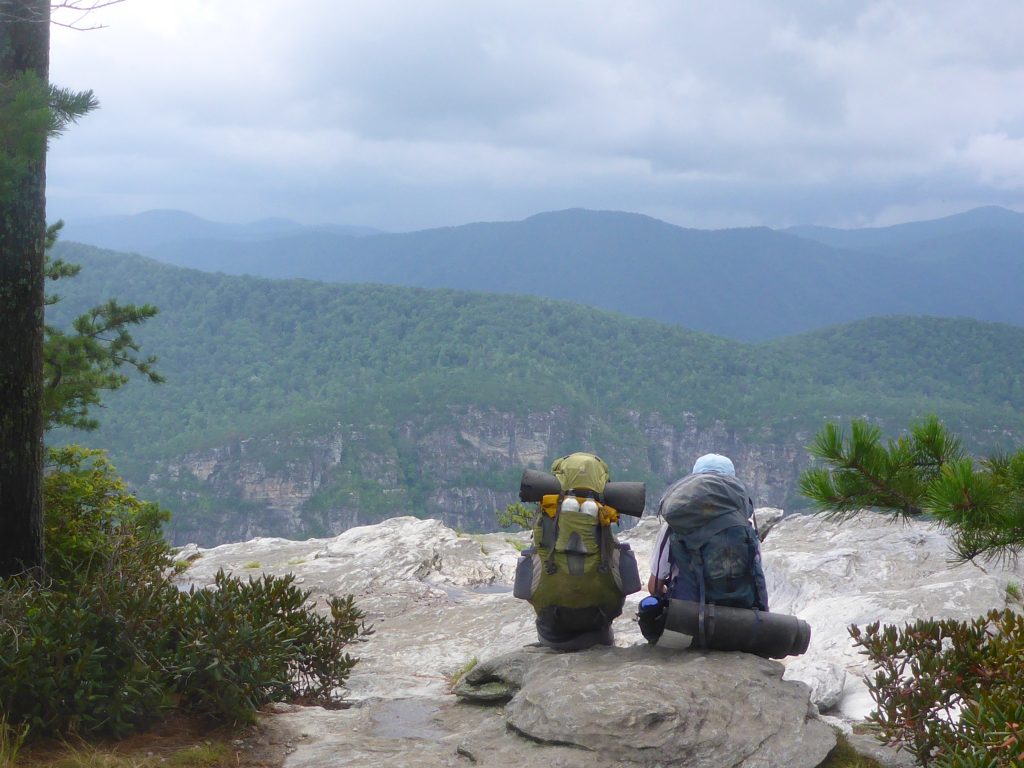
Encouraging your kids to get outside and having an open mindset to experiencing the outdoors is just as important as participating in wilderness activities with them.
Exploring Together
With Mother’s Day upon us, our thoughts turn to how parents, and especially mothers, guide us from our first steps and words to the adults we eventually become. For those of us who are still in the midst of raising our kids, the struggle to teach them what they need to know and how to live a productive life is real. Sometimes we can’t get them to even handle the basics, like homework or personal hygiene, let alone find deeper meaning and thoughtfulness in a quiet moment while stargazing. But we try, and eventually we find that our kids absorb some of our efforts with an abundant mix of their own interpretations and opinions mixed in.
“My mom is a big role model for me getting outdoors, camping and stuff since we’ve done that for as long as I can remember,” said Jayden. Speaking specifically about his mom, he mentioned learning that goes beyond outdoor skills: “She impresses me with the way she can take care of herself, but not just outdoors, doing what she does in general. Watching her go through life and seeing her try different things has led me to be more adventurous myself.”
Zachary admits that his Mom really impressed him when they went rock climbing together, saying “It’s not easy to do something that scares you, and she totally killed it! I don’t always get to high five my Mom, but we did it a lot that day.”
“My mom can’t start a fire and she pretty much hates camping,” said Blake, “but she encouraged me to try it and she let me stick with it because she said she likes who I am when I come home.”
That’s what it’s all about. As moms, if it’s good for the kids, they like it and learn from it, and if they’re better people on the other side of the experience, we’re in. Sign us up. If we get to come along (assuming we want to), and be a part of that adventure with our kids before they’re grown and gone, so much the better.
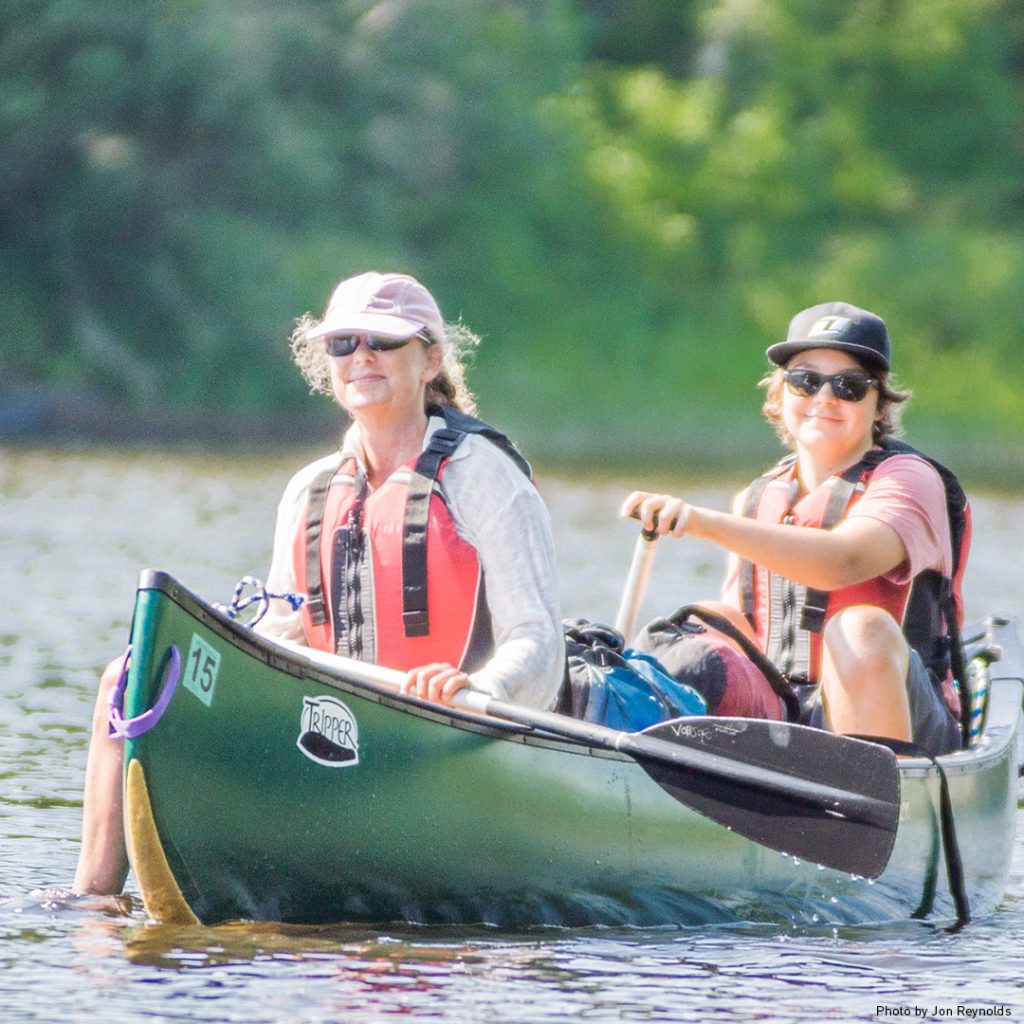
The family course is a unique opportunity to for parents and children alike to have an introductory Outward Bound experience together.
About the Author
LaRae Marsik has been a wilderness enthusiast since she took her first river trip down the Salmon and Green Rivers at the age of 12. She has paddled the Boundary Waters, hiked the Grand Canyon, jumped down the Great Sand Dunes by super moonlight, and conquered multiple 14ers in the Colorado Rocky Mountains, all with groups of young students who are growing to love the outdoors as she does. She is an independent contractor from Denver, working on various projects for Outward Bound as opportunities arise.
OTHER POSTS YOU MAY LIKE
Read More
Read More
Read More




